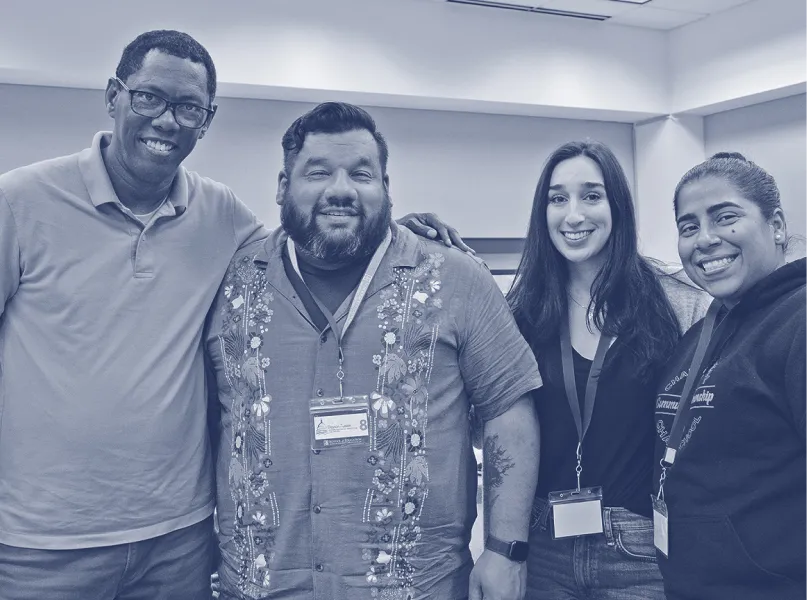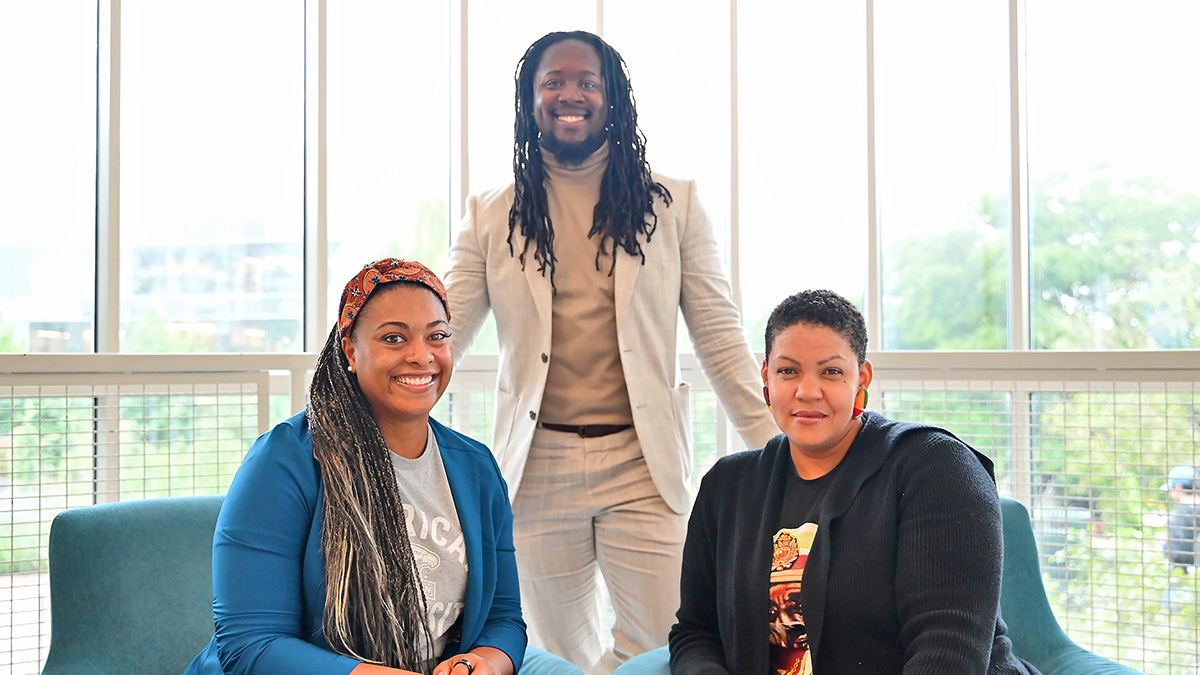
Join Our Alumni Network: Advance with Our Online Doctor of Education Program
American University’s School of Education believes education shouldn’t just focus on what students learn—it should provide students with an opportunity to reach their full potential and be a force for positive social change. Education should give students hope. Antiquated policies and structures have made hope hard to find in modern education, and the United States needs a new approach to education leadership and policy to bring hope and action to its schools.
The online Doctorate in Education Policy and Leadership (EdD) is a response to this need, empowering education leaders who have the practical experience and theoretical knowledge to effect widespread, progressive change in education. Whether they pursue opportunities in educational instruction, senior learning specialist jobs, organizational leadership, or policymaking, EdD graduates will be better prepared to change education for every student.
 Estimated Time to Completion
Estimated Time to Completion
Less than three years
 Online Coursework
Online Coursework
With three residency weekends in Washington, DC
 Required Credits
Required Credits
40 credits beyond an approved master’s degree
 Practitioner-Focused Coursework and Research
Practitioner-Focused Coursework and Research
Resulting in a Dissertation of Practice
Online EdD Program Pillars
Graduates of the online EdD program are equipped with the skills every education leader needs to be effective, including strategic budgeting, collaborative inquiry, talent management, partnership building, learning science, and program evaluation. We strive to hone students’ knowledge and develop their skills and beliefs in the following four domains:
-
Systems Change
-
Personal Leadership
-
Social Justice and Antiracism
-
Policy and Research
These domains serve as the backbone of our program and live out in each course, module, and residency experience our students engage in. After completing their coursework and problem of practice dissertation, students will have the policy, leadership, and research skills necessary to serve in senior positions in school district central offices, independent schools, nonprofit organizations, government agencies, advocacy organizations, senior learning specialist jobs, and more.

The Doctorate of Education Online Cohort Experience
Peer learning and a sustained learning network are essential hallmarks of the online EdD program. As a result, students will progress through the program as part of a cohort, taking the same courses and accomplishing program milestones together. We intentionally build a diverse cohort of students to contribute to the dynamic learning environment in the program. Learning will occur through robust dialogue, shared learning experiences, and presenting current professional work and doctoral research.
EdD in Education Policy & Leadership Career Opportunities
The American University online EdD in Education Policy and Leadership develop practitioner skills for improving practices in schools, for policy advocates, with nonprofits and other educational institutions. The following is a sample of educational leadership roles and their median annual wages per the U.S. Bureau of Labor Statistics (2024):
| Job | Median Annual Salary |
|---|---|
| Training and development manager | $125,040 |
| Top executives (e.g., school superintendents and college or university presidents) | $103,840 |
| School principal | $103,460 |
| Postsecondary education administrator | $102,610 |
| Postsecondary teacher | $84,380 |
| Instructional coordinator | $74,620 |
Curriculum
3 Hours
Synchronous
Live online classes with remote students in your cohort attended according to a specific schedule.
3 Hours
Asynchronous
Self-paced courses or work completed according to your schedule.
8-10 Hours
Assignments
Homework, projects, research, etc.
14-16 Hours
Total Weekly Hours
Hours are estimates and subject to change per term course.
EdD Domains & Competencies
-
Personal Mastery
-
Social Justice / Antiracism
-
Systems Thinking
-
Policy and Research
Doctorate of Education Residency
Students will participate in a three residency visits to Washington, DC, enabling them to interface with peers and faculty, encapsulated in the EDU-798 course.

Term 1
4 Days (Thurs to Sat)
Washington, DC
This residency will provide students with the engagement and opportunities to connect and build a strong cohort and professional network.
Presentations from academic resources and supports offered throughout their program will assist students with navigating the tools needed to be successful as an online doctor of education student. During the residency, students will participate in a public narrative workshop and begin to forge relationships with faculty they may partner with in the future.

Term 4
4 Days (Thurs to Sat)
Washington, DC
This residency will include an opportunity for education system leaders to present their own problem of practice to graduate students and faculty, demonstrating their commitment to antiracist research.
Students will have time to engage with their committee chair for their dissertation. Students will be in DC and across cohorts and able to engage with each other.
Multiple cohorts will be in attendance, allowing students to engage in cross-cohort interaction.

Term 7
4 Days (Thurs to Sat)
Washington, DC
This residency will focus on writing your Dissertation of Practice, meeting with committee members, and preparing for your defense.
It will include an opportunity for education system leaders to present their methodological approaches and pilots from a critical race lens to their colleagues and faculty. Breakout sessions will include a review of research methodologies, designated time to prepare for Internal Review Board (IRB) clearance, and preparation for students’ defense of their proposals.
Upcoming Doctorate in Education Policy & Leadership (EdD) Open House
Wednesday, November 19, from 7-8 p.m. ET.
Empower Learners, Influence Systems, and Transform Education Through the Dissertation of Practice
In their dissertations, online EdD students undertake scholarly research to address complex educational challenges, identifying and solving real-world issues with the potential to create meaningful change.
Dr. Francesca Smith ’23 dedicated her dissertation to understanding bilingual students from Latinx immigrant families in dual-language English reading instruction. Her research earned her the Dissertation in Practice of the Year Award from the Carnegie Project on the Education Doctorate (CPED). Titled “Asset-Based Biliteracy: Recentering Emergent Bilingual Students in Dual Language English Reading Instruction,” her dissertation examines the effects of gentrifying dual-language schools and advocates for early literacy interventions to better support emerging bilingual students. READ MORE
Dr. Cheyenne E. Batista ’22 received the 2022 CPED Dissertation in Practice of the Year award from the Carnegie Project on Education Doctorate (CPED). Her dissertation, titled “I Am Not Scary. I Am Strong. There’s a Difference: Disrupting Misogynoir and Transforming Interpersonal Conflict for Black Women Education Leaders: A Multiple Case Study,” addresses important issues in education. Dr. Batista stated, “The findings have resonated deeply with many people. This award provides an opportunity to elevate essential conversations about interpersonal conflict, identity, and the experiences of Black women in leadership roles.” READ MORE
Gary DeShun Hamilton ’23, a first-generation college student, delivered the 2023 graduate address for the School of Education titled “The Bold Promise of Tomorrow.” In his speech, he urged educators to embrace antiracist pedagogy and remain committed to their students, emphasizing that education can lead to great achievements. His journey helps to fulfill this promise. Hamilton focused his Dissertation of Practice, “The Influence of Masculinity on Reading Engagement in Black Boys in Kindergarten through 5th Grade,” on issues concerning Black boys, including educational engagement, social-emotional learning, and instructional bias. READ MORE
In her dissertation, “It’s Going to Take a Village: Inclusive Equity Pauses for System Leaders,” Dr. Shareen Fernanders ’23 explored how urban public school system leaders collaborated to improve early literacy outcomes for historically oppressed, marginalized, and excluded (HOME) students. She identified that current strategic planning may have widened the literacy gaps between HOME students and their White peers. The collaboration often occurred in silos, limiting its effectiveness. Dr. Fernanders recommends that leaders systematically analyze their experiences and ensure that expertise is equitably valued, preventing feelings of marginalization and exclusion in planning efforts. READ MORE
What is the overall influence of reading equity, foundational literacy, teacher knowledge, teacher beliefs, and the crucial role of instructional leadership? Dr. Rebecca ‘Becky’ Nolin ’23’s dissertation, “We Can Do This: How Leaders Influence Teacher Beliefs that Contribute to Foundational Literacy Equity,” examined how school leaders impact teachers’ beliefs about students and literacy instruction. The study found that while leaders aimed to promote positive beliefs to support evidence-based teaching, teachers felt that their limited capacity hindered their ability to achieve success in literacy. Despite having confidence in their instructional skills, teachers held low expectations for student achievement. READ MORE
First Doctoral Cohort of Antiracist Changemakers
The doctoral program in education policy and leadership, launched in August 2019, is among the first to focus on antiracism. It provides aspiring education leaders a pathway to disrupt and transform US education systems. Dr. Samantha Cohen, Hurst senior professorial lecturer and SOE and EdD faculty, emphasized the importance of centering practice with an antiracist lens, saying, “For too long, K-12 education has catered to the average student. We have a moral obligation to ensure that all students, especially students of color, can choose their own futures.” READ MORE
Job Opportunities
The American University online EdD in Education Policy & Leadership prepares you for roles in policy, consulting, superintendency, and nonprofits. The following is a sample of educational leadership roles and their median annual wages per the U.S. Bureau of Labor Statistics (2024):
| Job | Median Annual Salary |
|---|---|
| Training and development Manager | $125,040 |
| Top executives (e.g., school superintendents and college or university presidents) | $103,840 |
| School principal | $103,460 |
| Postsecondary education administrator | $102,610 |
| Postsecondary teacher | $84,380 |
| Instructional coordinator | $74,620 |
Coursework
40 credits | 3 Required Residency Weekends in Washington, DC
EDU 704 Antiracism, Equity & Inclusion in Education (3)
Antiracism, Systems Thinking, Policy, Research
EDU 702 Collaborative Inquiry through Systems Thinking (3)
Personal Mastery, Antiracism Systems Thinking
EDU 798 Residency I (1)
Research, Personal Mastery, Antiracism
EDU 765 Exercising Conscious Leadership (3)
Personal Mastery, Antiracism
EDU 734 Education Policy Analysis (3)
Policy, Systems Thinking, Strategy, Antiracism
EDU 703 Applying Anti-Racist Methods I (3)
Systems Thinking Antiracism, Research
Elective (3)
EDU 709 Developing the Knowledge Review (3)
EDU 710 Applying Anti-Racist Methods II (3)
Research, Antiracism, Systems Thinking
EDU 798 Residency II (1)
Research, Personal Mastery, Antiracism
EDU 708 Building Teams & Growth Culture Practicum (3)
Personal Mastery, Systems Thinking, Antiracism
EDU 711 Applying Anti-Racist Methods III (3)
Research, Antiracism, Systems Thinking
EDU 880 Pre-Dissertation Seminar (3)
Elective (3)
EDU 707 Learning Sciences to Advance Equity (1)
EDU 798 Residency III (1)
Research, Personal Mastery, Antiracism
EDU 899 Doctoral Dissertation
Research, Anti-Racism, Personal Mastery, Systems Thinking, Policy, Strategy
Doctorate in Education Faculty and Staff Members


Samantha Cohen Hurst Senior Professorial Lecturer SOE | Online Partner Programs (OLP)

Amaarah DeCuir Senior Professorial Lecturer SOE | Online Partner Programs (OLP)

Andrea Guiden Pittman Senior Professorial Lecturer SOE | General Academics & Research

Eric Macias Professorial Lecturer SOE | Online Partner Programs (OLP)

Brian McGowan Professor SOE | Online Partner Programs (OLP)

Wendy Padin Padilla EdD Program Coordinator SOE | Online Partner Programs (OLP)

Eugene Pringle Senior Professorial Lecturer SOE | Online Partner Programs (OLP)
William N. Thomas IV Director of EdD Program & Professorial Lecturer SOE | Online Partner Programs (OLP)

Kenjus Watson Assistant Professor SOE | General Academics & Research
Doctorate Key Deadlines & Dates
Fall 2026 Start Date
| Date | Deadline For |
|---|---|
| October 15, 2025 | Priority Application Deadline |
| February 3, 2026 | Final Application Deadline |
| March 1, 2026 | Decision Notification |

Connect with Us
Speak to an Enrollment Advisor
Email: SOEOnline@american.edu | Call: 202-807-6173
Online Events
Schedule a School Tour
Our online students, as well as prospective students, are always welcome to tour our campus.
Email: SOEAdmissions@american.edu
FAQs
This program is designed for working PK-12 leaders who want to connect policy to practice and gain the practical knowledge and skills to transform their organizations and education systems.
Students will participate in a residency, visiting Washington, DC, enabling them to interface with peers and faculty. The program includes three (3) required DC residencies encapsulated in the EDU-798 course.
Residency I: The first residency will occur from Thursday to Saturday in Washington, DC, during the first month of Term 1. This residency will provide students with the engagement and supports needed to commit to their problem of practice and the program. This begins with the opportunity to work face-to-face with their professors and peers, specifically in their first-term courses. Presentations from academic resources and supports offered throughout their program will assist students with navigating the tools needed to be successful in their composition of a dissertation. The end of the residency will conclude with a presentation of their problem of practice.
Residency II: The second Thursday to Saturday residency in Washington, DC, occurs during the beginning of Term 4 and includes an opportunity for education system leaders to present their problem of practice to graduate students to demonstrate the variety of methodological approaches to educational inquiry. Breakout sessions include a review of research methodologies, designated time to prepare for Internal Review Board (IRB) clearance, and preparation for students’ defense of their proposals.
Residency III: This Thursday through Saturday residency focuses on writing your Dissertation of Practice, meeting with committee members, and preparing for your defense. It includes an opportunity for education system leaders to present their methodological approaches and pilots from a critical race lens to their colleagues and faculty. Breakout sessions include a review of research methodologies, designated time to prepare for Internal Review Board (IRB) clearance, and preparation for students’ defense of their proposals.
Admissions
Explore admissions requirements and apply to an online American University School of Education program.
Tuition & Financial Aid
Learn about tuition costs, financial aid, and scholarships you may be eligible to receive as you pursue your educational and career goals.
Student Experience
Discover how our innovative technology, thoughtfully designed curricula, and meaningful partnerships will prepare you to be the transformative educator you aspire to be.
